Fundamentals of Management: Leading and Managing Principles Report
VerifiedAdded on 2022/12/20
|6
|1164
|1
Report
AI Summary
This report delves into the distinctions between management and leadership, exploring how leadership characteristics and management skills contribute to a manager's effectiveness. The report uses personal experiences to illustrate key concepts, such as the importance of communication, team building, and knowledge. It examines the impact of leading on a manager's role, emphasizing the need for both rational and emotional approaches to employees. By comparing management and leadership roles, the report underscores their complementary nature within an organization. It concludes by highlighting how these roles are vital for achieving organizational goals, and the ability to influence people to complete tasks.
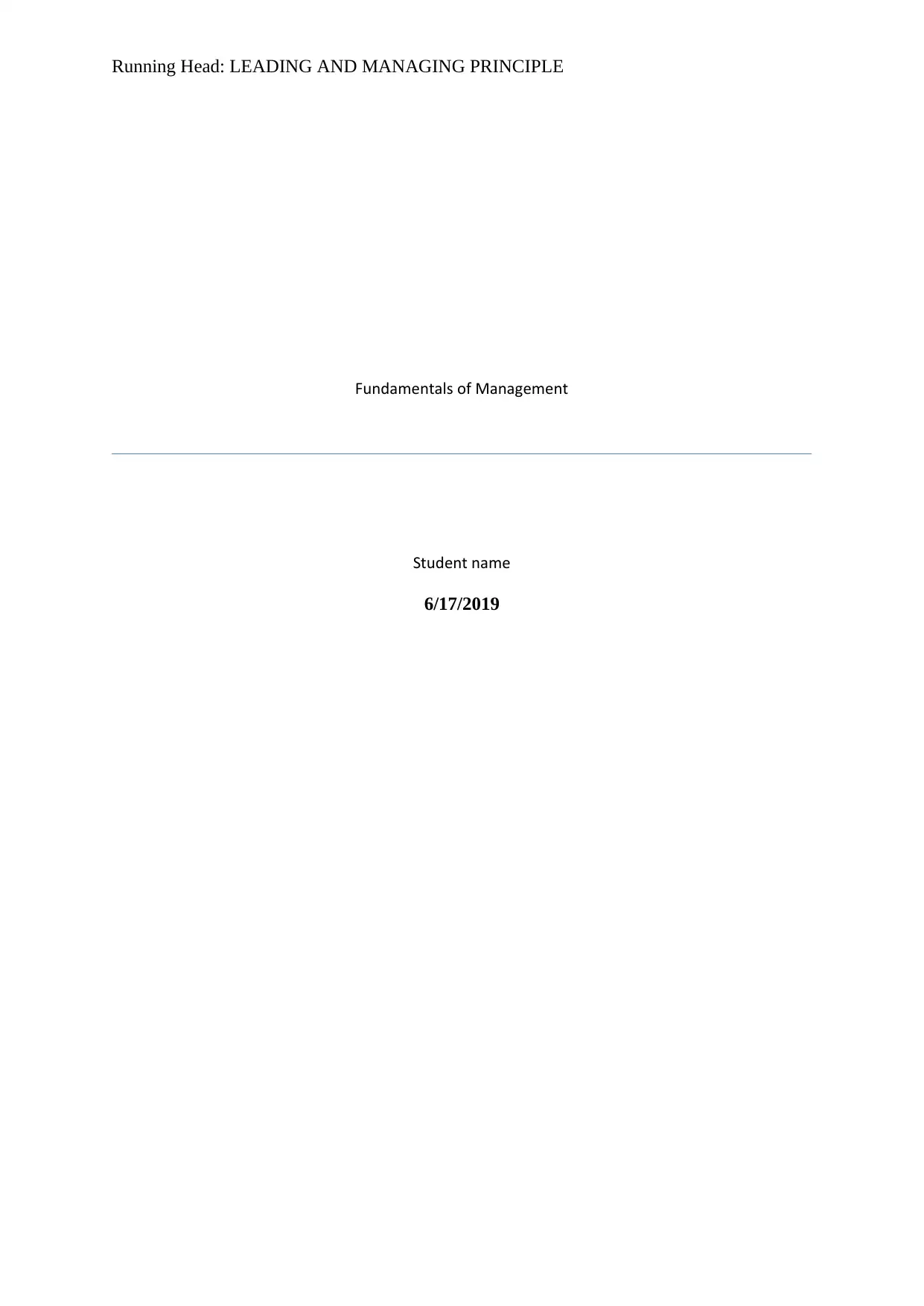
Running Head: LEADING AND MANAGING PRINCIPLE
Fundamentals of Management
Student name
6/17/2019
Fundamentals of Management
Student name
6/17/2019
Paraphrase This Document
Need a fresh take? Get an instant paraphrase of this document with our AI Paraphraser
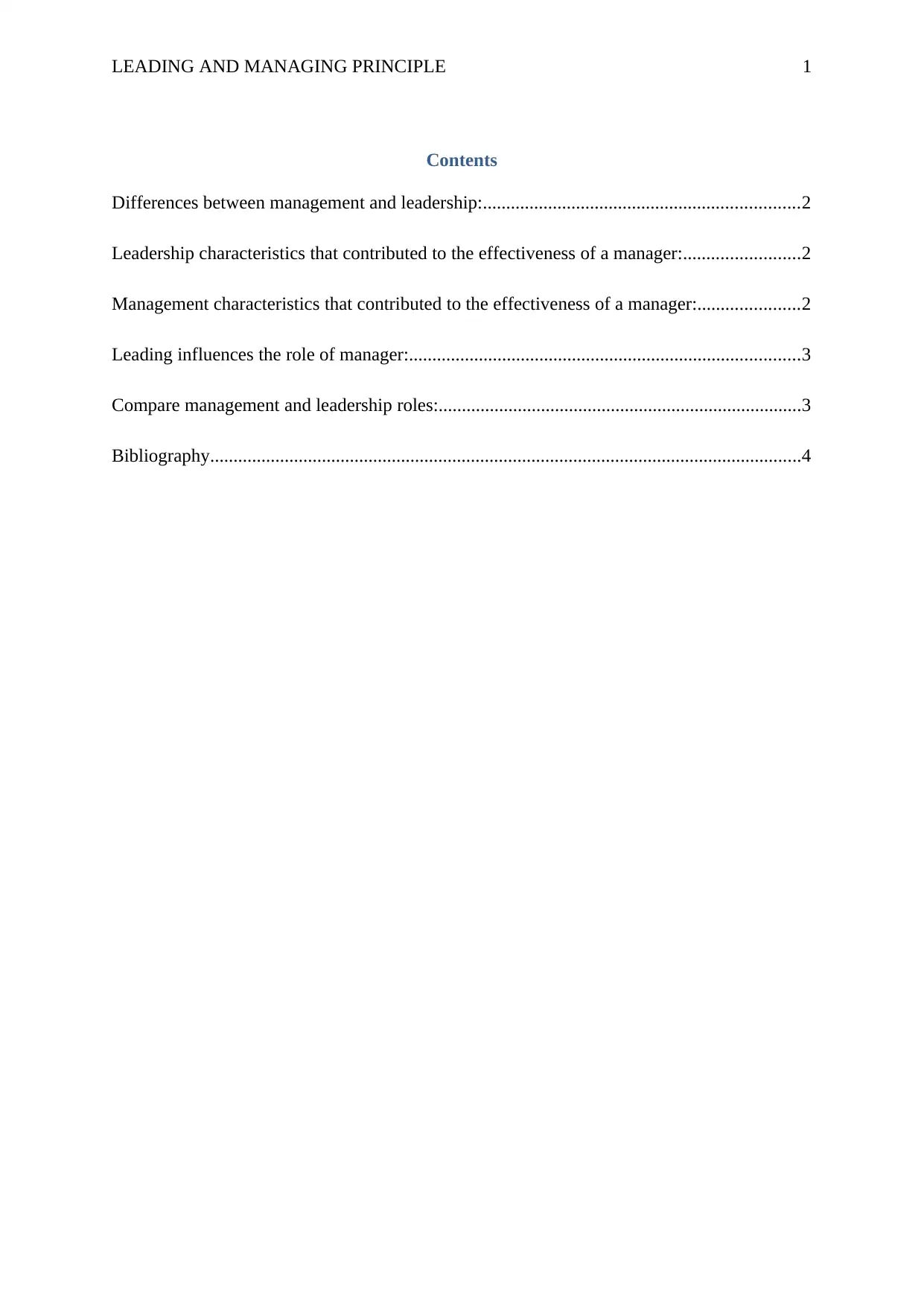
LEADING AND MANAGING PRINCIPLE 1
Contents
Differences between management and leadership:....................................................................2
Leadership characteristics that contributed to the effectiveness of a manager:.........................2
Management characteristics that contributed to the effectiveness of a manager:......................2
Leading influences the role of manager:....................................................................................3
Compare management and leadership roles:..............................................................................3
Bibliography...............................................................................................................................4
Contents
Differences between management and leadership:....................................................................2
Leadership characteristics that contributed to the effectiveness of a manager:.........................2
Management characteristics that contributed to the effectiveness of a manager:......................2
Leading influences the role of manager:....................................................................................3
Compare management and leadership roles:..............................................................................3
Bibliography...............................................................................................................................4
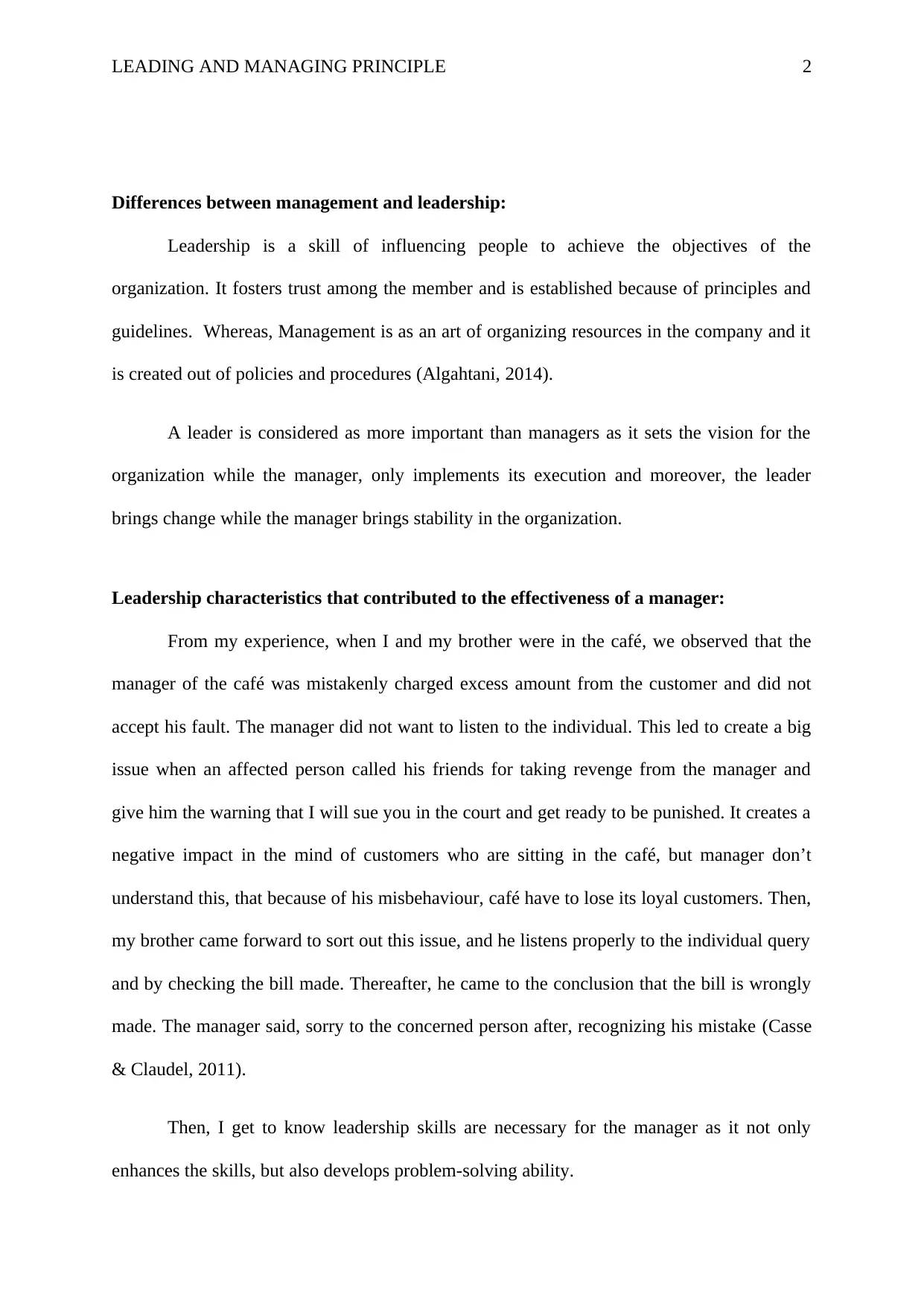
LEADING AND MANAGING PRINCIPLE 2
Differences between management and leadership:
Leadership is a skill of influencing people to achieve the objectives of the
organization. It fosters trust among the member and is established because of principles and
guidelines. Whereas, Management is as an art of organizing resources in the company and it
is created out of policies and procedures (Algahtani, 2014).
A leader is considered as more important than managers as it sets the vision for the
organization while the manager, only implements its execution and moreover, the leader
brings change while the manager brings stability in the organization.
Leadership characteristics that contributed to the effectiveness of a manager:
From my experience, when I and my brother were in the café, we observed that the
manager of the café was mistakenly charged excess amount from the customer and did not
accept his fault. The manager did not want to listen to the individual. This led to create a big
issue when an affected person called his friends for taking revenge from the manager and
give him the warning that I will sue you in the court and get ready to be punished. It creates a
negative impact in the mind of customers who are sitting in the café, but manager don’t
understand this, that because of his misbehaviour, café have to lose its loyal customers. Then,
my brother came forward to sort out this issue, and he listens properly to the individual query
and by checking the bill made. Thereafter, he came to the conclusion that the bill is wrongly
made. The manager said, sorry to the concerned person after, recognizing his mistake (Casse
& Claudel, 2011).
Then, I get to know leadership skills are necessary for the manager as it not only
enhances the skills, but also develops problem-solving ability.
Differences between management and leadership:
Leadership is a skill of influencing people to achieve the objectives of the
organization. It fosters trust among the member and is established because of principles and
guidelines. Whereas, Management is as an art of organizing resources in the company and it
is created out of policies and procedures (Algahtani, 2014).
A leader is considered as more important than managers as it sets the vision for the
organization while the manager, only implements its execution and moreover, the leader
brings change while the manager brings stability in the organization.
Leadership characteristics that contributed to the effectiveness of a manager:
From my experience, when I and my brother were in the café, we observed that the
manager of the café was mistakenly charged excess amount from the customer and did not
accept his fault. The manager did not want to listen to the individual. This led to create a big
issue when an affected person called his friends for taking revenge from the manager and
give him the warning that I will sue you in the court and get ready to be punished. It creates a
negative impact in the mind of customers who are sitting in the café, but manager don’t
understand this, that because of his misbehaviour, café have to lose its loyal customers. Then,
my brother came forward to sort out this issue, and he listens properly to the individual query
and by checking the bill made. Thereafter, he came to the conclusion that the bill is wrongly
made. The manager said, sorry to the concerned person after, recognizing his mistake (Casse
& Claudel, 2011).
Then, I get to know leadership skills are necessary for the manager as it not only
enhances the skills, but also develops problem-solving ability.
⊘ This is a preview!⊘
Do you want full access?
Subscribe today to unlock all pages.

Trusted by 1+ million students worldwide
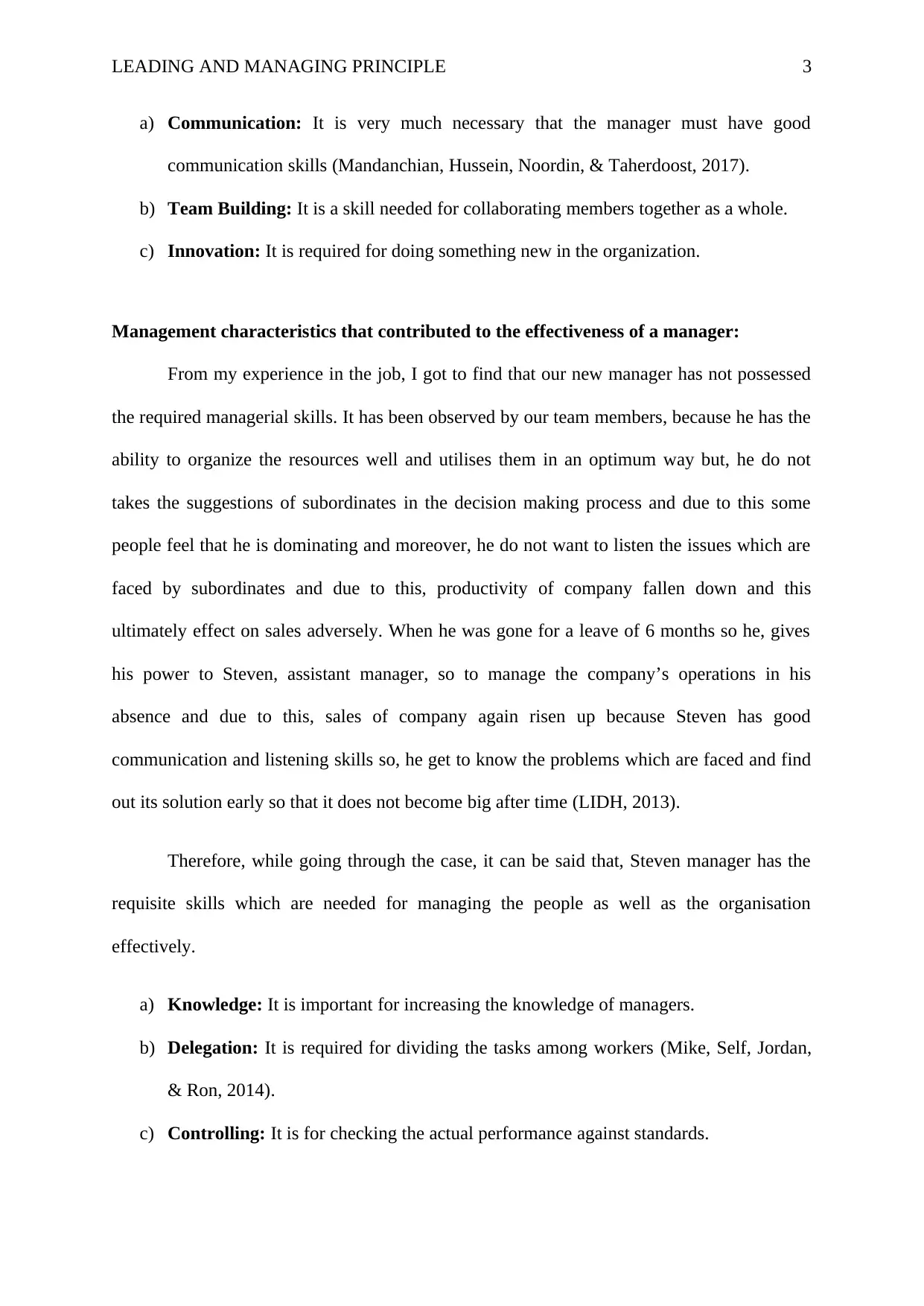
LEADING AND MANAGING PRINCIPLE 3
a) Communication: It is very much necessary that the manager must have good
communication skills (Mandanchian, Hussein, Noordin, & Taherdoost, 2017).
b) Team Building: It is a skill needed for collaborating members together as a whole.
c) Innovation: It is required for doing something new in the organization.
Management characteristics that contributed to the effectiveness of a manager:
From my experience in the job, I got to find that our new manager has not possessed
the required managerial skills. It has been observed by our team members, because he has the
ability to organize the resources well and utilises them in an optimum way but, he do not
takes the suggestions of subordinates in the decision making process and due to this some
people feel that he is dominating and moreover, he do not want to listen the issues which are
faced by subordinates and due to this, productivity of company fallen down and this
ultimately effect on sales adversely. When he was gone for a leave of 6 months so he, gives
his power to Steven, assistant manager, so to manage the company’s operations in his
absence and due to this, sales of company again risen up because Steven has good
communication and listening skills so, he get to know the problems which are faced and find
out its solution early so that it does not become big after time (LIDH, 2013).
Therefore, while going through the case, it can be said that, Steven manager has the
requisite skills which are needed for managing the people as well as the organisation
effectively.
a) Knowledge: It is important for increasing the knowledge of managers.
b) Delegation: It is required for dividing the tasks among workers (Mike, Self, Jordan,
& Ron, 2014).
c) Controlling: It is for checking the actual performance against standards.
a) Communication: It is very much necessary that the manager must have good
communication skills (Mandanchian, Hussein, Noordin, & Taherdoost, 2017).
b) Team Building: It is a skill needed for collaborating members together as a whole.
c) Innovation: It is required for doing something new in the organization.
Management characteristics that contributed to the effectiveness of a manager:
From my experience in the job, I got to find that our new manager has not possessed
the required managerial skills. It has been observed by our team members, because he has the
ability to organize the resources well and utilises them in an optimum way but, he do not
takes the suggestions of subordinates in the decision making process and due to this some
people feel that he is dominating and moreover, he do not want to listen the issues which are
faced by subordinates and due to this, productivity of company fallen down and this
ultimately effect on sales adversely. When he was gone for a leave of 6 months so he, gives
his power to Steven, assistant manager, so to manage the company’s operations in his
absence and due to this, sales of company again risen up because Steven has good
communication and listening skills so, he get to know the problems which are faced and find
out its solution early so that it does not become big after time (LIDH, 2013).
Therefore, while going through the case, it can be said that, Steven manager has the
requisite skills which are needed for managing the people as well as the organisation
effectively.
a) Knowledge: It is important for increasing the knowledge of managers.
b) Delegation: It is required for dividing the tasks among workers (Mike, Self, Jordan,
& Ron, 2014).
c) Controlling: It is for checking the actual performance against standards.
Paraphrase This Document
Need a fresh take? Get an instant paraphrase of this document with our AI Paraphraser
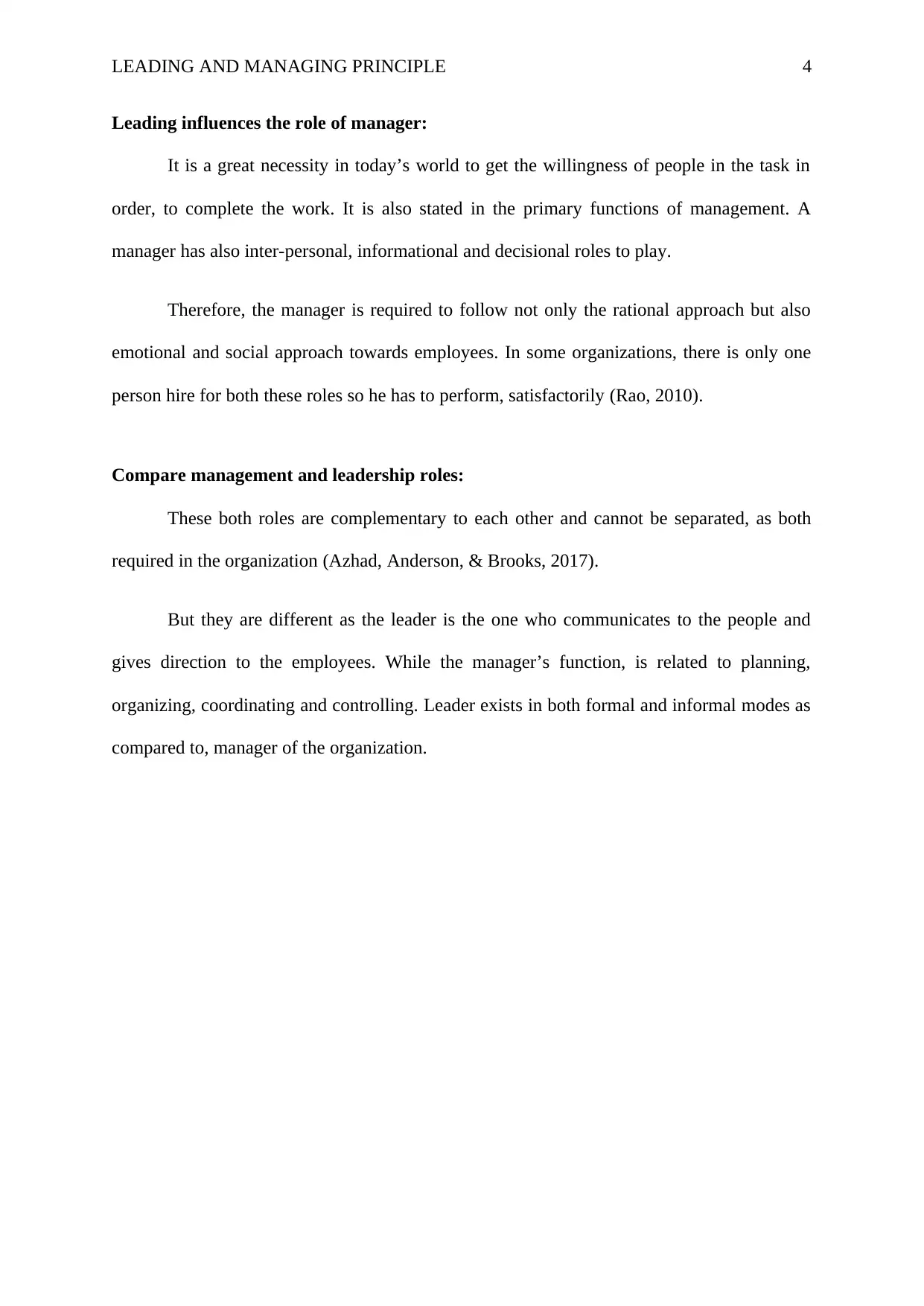
LEADING AND MANAGING PRINCIPLE 4
Leading influences the role of manager:
It is a great necessity in today’s world to get the willingness of people in the task in
order, to complete the work. It is also stated in the primary functions of management. A
manager has also inter-personal, informational and decisional roles to play.
Therefore, the manager is required to follow not only the rational approach but also
emotional and social approach towards employees. In some organizations, there is only one
person hire for both these roles so he has to perform, satisfactorily (Rao, 2010).
Compare management and leadership roles:
These both roles are complementary to each other and cannot be separated, as both
required in the organization (Azhad, Anderson, & Brooks, 2017).
But they are different as the leader is the one who communicates to the people and
gives direction to the employees. While the manager’s function, is related to planning,
organizing, coordinating and controlling. Leader exists in both formal and informal modes as
compared to, manager of the organization.
Leading influences the role of manager:
It is a great necessity in today’s world to get the willingness of people in the task in
order, to complete the work. It is also stated in the primary functions of management. A
manager has also inter-personal, informational and decisional roles to play.
Therefore, the manager is required to follow not only the rational approach but also
emotional and social approach towards employees. In some organizations, there is only one
person hire for both these roles so he has to perform, satisfactorily (Rao, 2010).
Compare management and leadership roles:
These both roles are complementary to each other and cannot be separated, as both
required in the organization (Azhad, Anderson, & Brooks, 2017).
But they are different as the leader is the one who communicates to the people and
gives direction to the employees. While the manager’s function, is related to planning,
organizing, coordinating and controlling. Leader exists in both formal and informal modes as
compared to, manager of the organization.
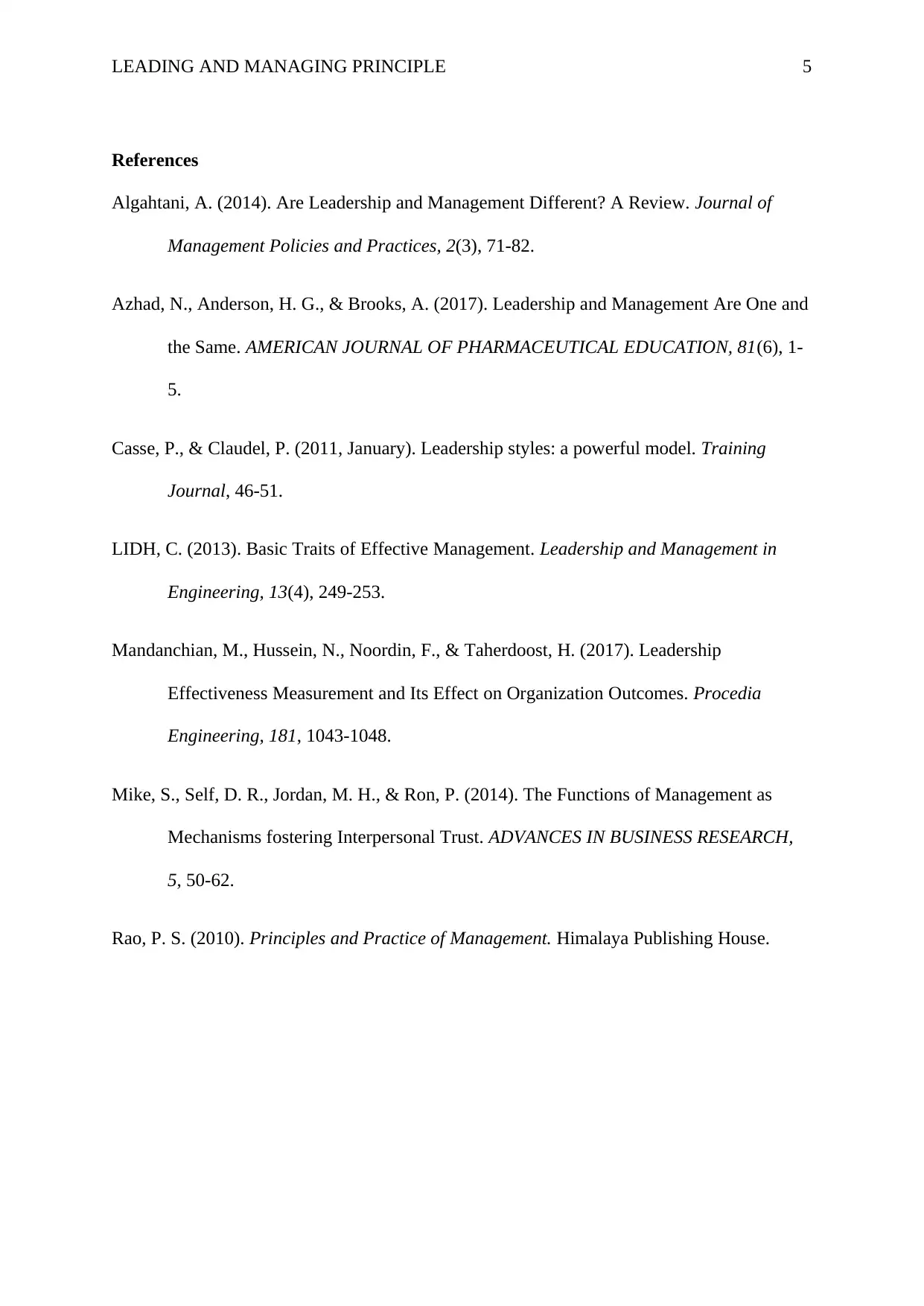
LEADING AND MANAGING PRINCIPLE 5
References
Algahtani, A. (2014). Are Leadership and Management Different? A Review. Journal of
Management Policies and Practices, 2(3), 71-82.
Azhad, N., Anderson, H. G., & Brooks, A. (2017). Leadership and Management Are One and
the Same. AMERICAN JOURNAL OF PHARMACEUTICAL EDUCATION, 81(6), 1-
5.
Casse, P., & Claudel, P. (2011, January). Leadership styles: a powerful model. Training
Journal, 46-51.
LIDH, C. (2013). Basic Traits of Effective Management. Leadership and Management in
Engineering, 13(4), 249-253.
Mandanchian, M., Hussein, N., Noordin, F., & Taherdoost, H. (2017). Leadership
Effectiveness Measurement and Its Effect on Organization Outcomes. Procedia
Engineering, 181, 1043-1048.
Mike, S., Self, D. R., Jordan, M. H., & Ron, P. (2014). The Functions of Management as
Mechanisms fostering Interpersonal Trust. ADVANCES IN BUSINESS RESEARCH,
5, 50-62.
Rao, P. S. (2010). Principles and Practice of Management. Himalaya Publishing House.
References
Algahtani, A. (2014). Are Leadership and Management Different? A Review. Journal of
Management Policies and Practices, 2(3), 71-82.
Azhad, N., Anderson, H. G., & Brooks, A. (2017). Leadership and Management Are One and
the Same. AMERICAN JOURNAL OF PHARMACEUTICAL EDUCATION, 81(6), 1-
5.
Casse, P., & Claudel, P. (2011, January). Leadership styles: a powerful model. Training
Journal, 46-51.
LIDH, C. (2013). Basic Traits of Effective Management. Leadership and Management in
Engineering, 13(4), 249-253.
Mandanchian, M., Hussein, N., Noordin, F., & Taherdoost, H. (2017). Leadership
Effectiveness Measurement and Its Effect on Organization Outcomes. Procedia
Engineering, 181, 1043-1048.
Mike, S., Self, D. R., Jordan, M. H., & Ron, P. (2014). The Functions of Management as
Mechanisms fostering Interpersonal Trust. ADVANCES IN BUSINESS RESEARCH,
5, 50-62.
Rao, P. S. (2010). Principles and Practice of Management. Himalaya Publishing House.
⊘ This is a preview!⊘
Do you want full access?
Subscribe today to unlock all pages.

Trusted by 1+ million students worldwide
1 out of 6
Related Documents
Your All-in-One AI-Powered Toolkit for Academic Success.
+13062052269
info@desklib.com
Available 24*7 on WhatsApp / Email
![[object Object]](/_next/static/media/star-bottom.7253800d.svg)
Unlock your academic potential
Copyright © 2020–2026 A2Z Services. All Rights Reserved. Developed and managed by ZUCOL.


![Leadership and Management Reflection Report - [Course Name]](/_next/image/?url=https%3A%2F%2Fdesklib.com%2Fmedia%2Fimages%2Ftd%2F609a50cd4c7044d196b9d89d4e436278.jpg&w=256&q=75)


